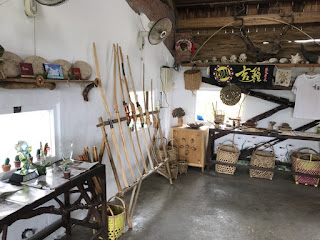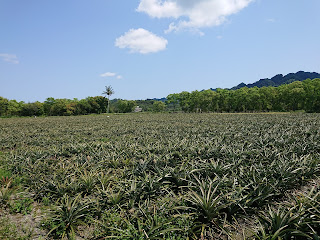April 15, 2018. The day began with a press
conference at the Promised Land Resort 理想大地渡假村 in Shoufeng Township 壽豐鄉. The particular building where the press event
was set up was actually a former pig pen.
Converted into a relaxing space for coffee, tea and locally made cakes and tapas,
it also offers smaller side rooms for special courses in coffee tasting offered
to guests of the resort. Few people know
that Hualien grows coffee, and that coffee grown in Hualien was once the
designated drink of the Japanese emperor during the colonial period. Unfortunately
most of the press questions during the conference here involved highly political issues unrelated to Hualien. But the setting of a fish pond and greenery
outside the broad window provided good scenery as a backdrop.
The Promised Land Resort is uniquely made up
of canals and Spanish style low-rise buildings.
Though the canals are man-made, they blend easily into the natural
scenery, utilizing clean ground water.
Guests are invited to take a ride in a small boat or raft, with a guided
tour of the local ecology.
http://www.plcresort.com.tw/
 |
| Scene of the Promised Land Resort from our boat |
After the press were given the opportunity
to drill the Premier with all their questions, we headed toward the coastal
region of Shoufeng Township 壽豐鄉, to the village
of Shuilian 水璉村, for an Amis cultural experience at
the Cidal Hunter School 吉籟獵人學校. Though the name may mislead one to think this
is a place for hunting training, it is actually more of a cultural preservation
and educational site for traditional Amis lifestyle and the surrounding
ecology. Normally the school takes
reservations for visitors in small or large groups, for an Amis meal, but also
various lifestyle experiences. Our
delegation members were shown some traditional Amis outdoor survival skills,
such as building a fire for cooking, making utility string out of betel nut
husk, and making a portable water utensil out of a large Gupuo Taro Leaf 姑婆芋. The presentation ended with
a dance in festive Amis style, around a circle in crossed and locked
hands. http://www.cidal.com.tw/
 |
| Cidal Hunter School displaying handmade arches and various traditional utensils |
Finally, at Cidal Hunter School Premier
Lai got a personal lesson in Amis archery, using a beautiful hand-made wooden
arch, he hit the target, not an animal, in three shots.
By the roadside entrance of the hunting school
there is the Flying Fish Market 飛魚市集.
From
April through the summer, flying fish appear in the coastal waters, and become
a favorite traditional delicacy of the Amis tribes.
The fish are dried and smoked in a
traditional oven and sold along the coastal route 11.
Other traditional Amis vegetables and bananas
are sold here, too, and Premier Lai not only bought all the flying fish
available as a snack for the press, he also bought a chunk of freshly picked
coastal small bananas.
 |
| A personal lesson in traditional Amis archery |
 |
| Seasonal flying fish 飛魚, a delicacy of indigenous peoples in the coastal area |
Lunch today was arranged at Chef Ming’s 銘師父 in Jian Township吉安鄉. Here Chef Zhuang Mingzhong uses his skill to
turn local agricultural products into delicate gourmet meals. I recommended this restaurant knowing that
Chef Ming has worked with local farmers, integrating locally grown vegetables
into his cuisine, giving his cuisine a unique Hualien style. He is familiar with traditional ingredients
of the Amis culture, but he has also created banquets in Hakka style. Chef Ming provides a gourmet fusion of
indigenous tribes and Hakka cuisine. The
full course meal is usually overfilling, but a reservation can be made for
smaller portions and more flavors and tastes.
The restaurant is located on a small mountainside street, but there is
plenty of room for parking and for larger groups. https://www.facebook.com/ChefMing/
 |
| Chef Ming's starting course including locally grown vegetables and rice |
One cannot tour Hualien without doing some
shopping. Premier Lai says he is not
much of a shopper and hardly ever shops, but he is fond of traditional
Taiwanese snacks. To find truly local
souvenirs and tastes, we visited the “Stories Behind the Mountain” 後山山後故事館 shop. This shop is actually a
platform sponsored by the Ministry of Economic Affairs, to support and enable
local artisans, designers, farmers, and small entrepreneurs, to design,
display, and sell their products. It is
located at the edge of the Guanghwa Industrial Park 光華工業區, on the main oceanside road just south of Hualien City, and on the third floor is a display of the local stone and
marble-cutting industry, almost a museum of marble products. Here Premier Lai was first attracted to a
wine carrying bag, designed by a Sakiraya artist in various indigenous styles. He bought one in the Puyuma style, claiming
he would give it as a gift to a friend with a bottle of Taiwanese whisky
inside. In the food and snacks section,
he selected a box of corn biscuits made of organic corn grown in the Chimei
tribe 奇美部落, called “Bad Mountain Boar,”山豬壞壞 indicating how precious the corn was, surviving hungry mountain
boars in the area. His shopping basket
also included locally grown peanuts and rice cakes from neighboring Taitung
County. More information on the shop and
its products can be found on the website https://www.storiesbtm.com/storiesbtm/
 |
| Shopping for a wine-carrying sleave designed by an indigenous artist |
The final stop of the tour was at the Fish
Bar 洄游吧 in a small fishing village 康樂村next to the Seven
Stars Bay Cixingtan七星潭.
Run by the third generation of a fishing family in the village, Fish Bar
is not just a place to eat and buy fresh fish.
It is also a classroom to help visitors understand marine life and
sustainable fishing traditions in the area.
Huang Wenchi 黃紋琪 articulately explained sustainable
fishing methods and consumption, using pictures and a model of a fishing net designed
to capture the desired fish. A large
mahi mahi, a catch of the day, was displayed and then given to Premier Lai to
cook, easily pan fried in olive oil with a little salt. Though he seemed a bit awkward, with a little
help from kitchen-capable legislator Kolas Yotaka, he produced a delicious, marine-friendly
dish for us to taste. Usually a tour at
the Fish Bar will include a walk outside on the beach, where twice a day,
fishermen will bring in their catch on small rafts, pushed onto shore by heavy
waves common in eastern Taiwan, where the ocean floor drops sharply. Unfortunately, due to the wind and rain, and
running overtime in our schedule for the day, we missed this part of the demonstration
of a Seven Stars Bay fisherman’s daily routine.
But this regret was something that hopefully will bring visitors back a
second time. https://fishbar.com.tw/
 |
| Mahi mahi, catch of the day |
 |
| Pan-fried mahi mahi, with a little help from Kolas (left) |










Great Journey !!!
回覆刪除